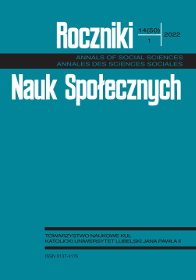Leadership Models in the Democratic People’s Republic of Korea
Abstract
This article analyzes leadership models in the Democratic People’s Republic of Korea (DPRK). It concerns the three leaders ruling in successive historical periods, from 1948 (from the proclamation of the DPRK) to the present day. The aim of this article is to place the leadership types of North Korean dictators within the framework of political leadership theoretical concepts and then compare them with each other. This article’s main research problem is an attempt to answer the question: Are we dealing with a single model of political leadership in the DPRK, or maybe individual dictators, despite some similarities in the way they rule, are different from each other? After analyzing the way of coming to power, the characterological features, the circumstances and manner of governing, and changes made to the political system via changes to the Constitution, it was possible to point out differences and similarities in the leadership models of Kim Il-sung, Kim Jong-il and Kim Jong-un. In this article, the author uses the comparative, legal-dogmatic and historical analysis methods.
References
Antoszewski A., (2002), Przywództwo polityczne, [w:] B. Szmulik, M. Żmigrodzki (red.), Wprowadzenie do nauki o państwie i polityce, Lublin: Wydawnictwo UMCS.
Aoki N., (2012), Korea’s Third Kim: Will Anything Change?, World Affairs, 174(6), s. 15-20.
Armstrong C. K., (2001), The Kim is Dead! Long Live the Kim!, Journal of International Affairs, 54(2), s. 509-513.
Armstrong C. K., (2011), Trends in the Study of North Korea, The Journal of Asian Studies, 70(2), s. 357-371.
Buczek L., (2016), Zagrożenia bezpieczeństwa na Półwyspie Koreańskim za rządów Kim Dzong Una, Roczniki Nauk Prawnych, 26(1), s. 27-49.
Cha V., (2011), The End of History: ‘Neojuche Revivalism’ and Korean Unification, Orbis, 55(2), s. 290-297.
Dziak W. J., (2003), Korea pokój czy wojna?, Warszawa: Świat Książki.
Dziak W. J., (2004), Kim Jong Il, Warszawa: TRIO, Instytut Studiów Politycznych PAN.
Fitzpatrick M., (2013), North Korea: Is Regime Change the Answer?, Survival Global Politics and Strategy, 55(3), s. 7-20.
Frank R., (2012), North Korea After Kim Jong Il: The Kim Jong Un Era and Its Challenges, The Asia-Pacific Journal, 10(2), s. 1-18.
Gabroussenko T., (2009), North Korean “Rural Fiction” from the Late 1990s to the Mid-2000s: Permanence and Change, Korean Studies, nr 33, s. 69-100.
Heywood A., (2006), Politologia, Warszawa: PWN.
Hoare J., (2013), „Long Live the Dear Respected Marshal Kim Jong Un!” North Korea since the Death of Kim Jong Il, Asian Affairs, 44(2), s. 188-201.
Izatt H. J., (2010), Can North Korea Develop? Developmental Dictatorship versus the China Reform Model, Asian Politics & Policy, nr 2, s. 175-195.
Jeung Young-Tai, (2007), North Koreaʼs Civil-Military-Party Relations and Regime Stability, Seoul: Korea Institute for National Unification.
Kwon Heonik, (2010), North Korea’s Politics of Longing, Critical Asian Studies, 42(1), s. 3-24.
Lankov A. N., (1999), Kim Il Sung’s Campaign against the Soviet Faction in Late 1955 and the Birth of Chuch’e, Korean Studies, nr 23, ss. 43-67.
Laska A., Nocoń J., (2010), Teoria polityki. Wprowadzenie, Warszawa: Wydawnictwo Wyższej Szkoły Pedagogicznej.
Lee Kyo-Duk, Lim Soon-Hee, Cho Jeong-Ah, Song Joung-Ho, (2013), Study on the Power Elite of the Kim Jong Un Regime, Seoul: Korea Institute for National Unification.
Lim Jae-Cheon, (2012), North Korea’s Hereditary Succession Comparing Two Key Transitions in the DPRK, Asian Survey, 52(3), s. 550-570.
O’Grady B., (2017), The Assassination of Kim Jong Nam, Advisor Perspectives (data dodania: 7.03.2017).
Park Hyeong Jung, Choi Sahyun, (2014), Fiscal Segmentation and Economic Changes in North Korea, Seoul: Korea Institute for National Unification.
Pliszka, B., Nawała P., (2019), Ideologiczna ewolucja Korei Północnej, Przegląd Geopolityczny, t. 27, s. 59-77.
Rüdiger F., (2016), The 7th Party Congress in North Korea: An Analysis of Kim Jong Un’s Report, The Asia-Pacific Journal, 14(8), 4927.
Szalontai B., Choi Ch., (2012), The Prospects of Economic Reform in North Korea: Comparisons with China, Vietnam and Yugoslavia, Europe-Asia Studies, 64(2), s. 227-246.
Torres C. B., (2013), Cambios en el poder, mismo comportamiento. Las relaciones con el nuevo liderazgo Chino, Documento Opinión, nr 82, s. 1-14.
Zook D. C., (2012), Reforming North Korea: Law, Politics, and the Market Economy, Stanford Journal of International Law, 48(1), s. 146.
Żukiewicz P., (2012), Przywództwo labilne: Mechanizm powrotu do władzy w świetle teorii przywództwa politycznego, Wrocław–Poznań: Centrum Analiz Systemów Politycznych.
National Committee on North Korea, NCNK, Traitor Jang Song Thaek Executed (data dodania: 13.12.2015), https://www.ncnk.org/resources/publications/Jang_Execution_Statement.pdf [dostęp: 26.01.2021].
Copyright (c) 2022 Roczniki Nauk Społecznych

This work is licensed under a Creative Commons Attribution-NonCommercial-NoDerivatives 4.0 International License.


